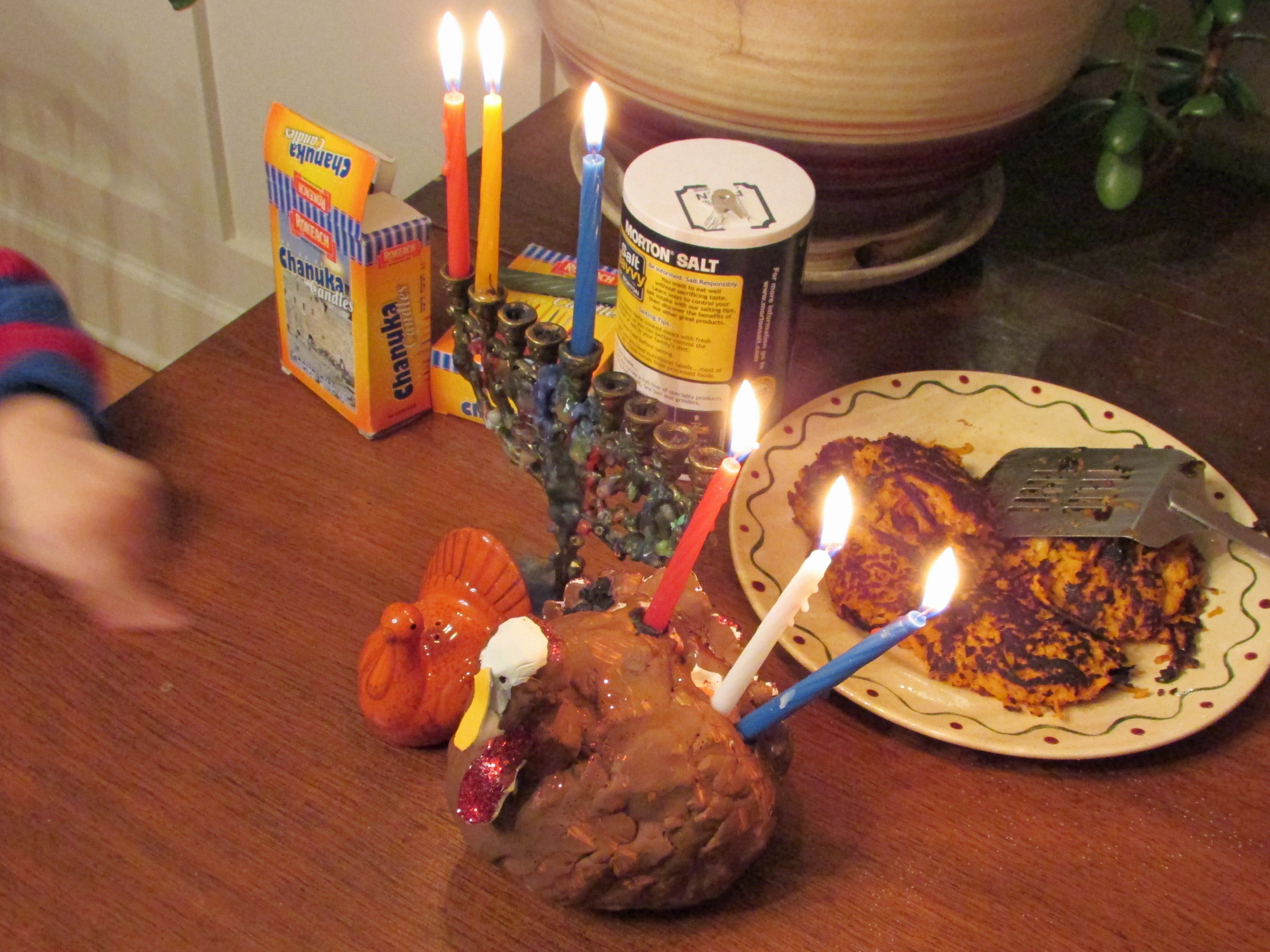
Over the past several weeks, reminders of the occurrence of Thanksgivukah were impossible to avoid. Hanukkah was to coincide with Thanksgiving, for the first time in over 100 years and for what will allegedly be the last time in 70,000 years. Surely, this was an event this dramatic could not be overlooked! On the contrary, it must be celebrated!
At least this is the viewpoint taken by much of the American Jewish community, if the Internet and various social media outlets are any indication. I admit that I—encapsulated in the frenzy—emailed my parents a multitude of Hanukkah themed Thanksgiving recipes; sweet potato latkes and Manischewitz-brined turkey sounded delicious. The combination was also particularly exciting, because Hanukkah seemingly received much more attention than it is accustomed to in the U.S., and several friends reveled in the so-called “Hanukkah spirit.” There were some, however, who rather lamented the fact that, though not overshined by the general Holiday Season as it often is, we were not able to celebrate Hanukkah this year without thinking of the secular holiday that accompanied it.
My family, for instance, elected to have two separate meals: one to celebrate each of the holidays. While mixing the menus had some novel appeal, we regretted the possibility of missing out on our traditional turkey and sweet potato casserole in an attempt to make it Hanukkah-esque. Likewise we couldn’t help but feel that in the process of “sprucing up” our latkes, brisket and sufganiot to celebrate Thanksgiving, something about them, something we looked forward to every year, would be lost. Inherently, in combining our celebrations of the two holidays, we would have to value one over the other: Would it be a Hanukkah-themed Thanksgiving or a Thanksgiving-themed Hanukkah? While we would have both, would we emphasize the Jewish holiday or the American one? Just as we didn’t want to make a value judgment between our Jewish identities and our secular identities because they were both so important to us, this was a prioritization that we simply did not want to make. By the end of the holiday, I was thoroughly convinced of this viewpoint.
I heard several stories, however, from extended family and friends, about a joyous and, above all, fun Thansgivukkah, and one that did not cause them to feel as though they neglected to celebrate one of the holidays. Sure, they changed the routine—they didn’t adhere to all of either of their regular traditions—but they seemed convinced that they captured the essentials of both. How, I wondered, could they divide this so easily? Wouldn’t it be easier, and more meaningful, to divide their time? Wouldn’t it be nicer for those who celebrated both holidays to have a set time for eating Hanukkah foods and a set one for eating Thanksgiving foods? Wouldn’t it be nicer, for those who identified as both Jewish and secular, to have a set time for being Jewish and a set time for being secular?
This was finally rectified in my mind when I returned to campus after Thanksgiving break. Having been unable to attend the Jewish organizations’ candle lighting on campus, I decided to light candles myself in my dorm. When I asked my (non-Jewish) friend to borrow his lighter to light the shamash, I was shocked at his eagerness to want to observe Hanukkah with me. Forming friendships with those who have different religious beliefs does not go against my beliefs, but I create such friendships acting as a part of my secular rather than religious life. I was surprised, therefore, that as I sang the prayers with the shamash in my hand, my friend was enthralled, and the ritual was that much more special for my ability to share it. At the moment I realized that just because I was acting “Jewish” in my observing a Jewish holiday, I didn’t cease to maintain my secular identity. It was in fact the union of my Jewish and secular identities—the tradition that my religious life taught me and the friendship I had made in my secular life—that allowed us to have such a meaningful experience.
Ultimately, Thanksgivikkah represents a union between secular and religious identities that cannot necessarily be divided. Even when I am acting in a “Jewish” manner—for instance when I am observing the holidays—I do not cease to be the person I exist as in my secular life. Likewise, even when I am not thinking about my Judaism per se, it, and the ethical values it has taught me, remains an integral part of who I am. The two are not only not mutually exclusive, they cannot be adequately divided. It just took me lighting a Hannukkia decorated with a turkey with a non-Jewish friend in my dorm room to realize this.
Dani Plung is a student at the University of Chicago.
